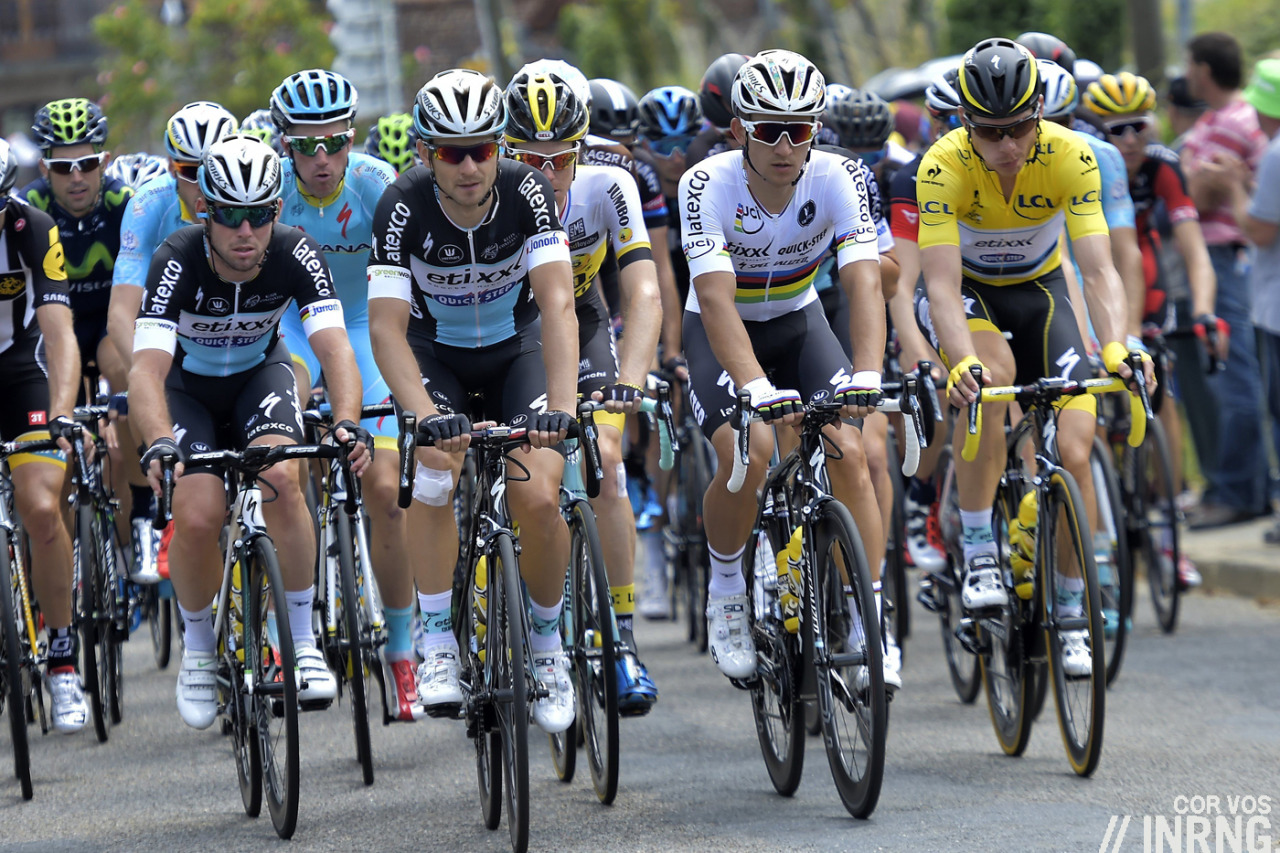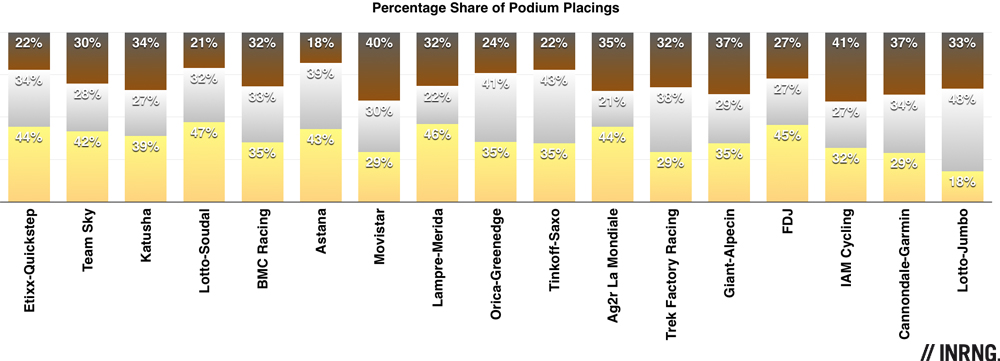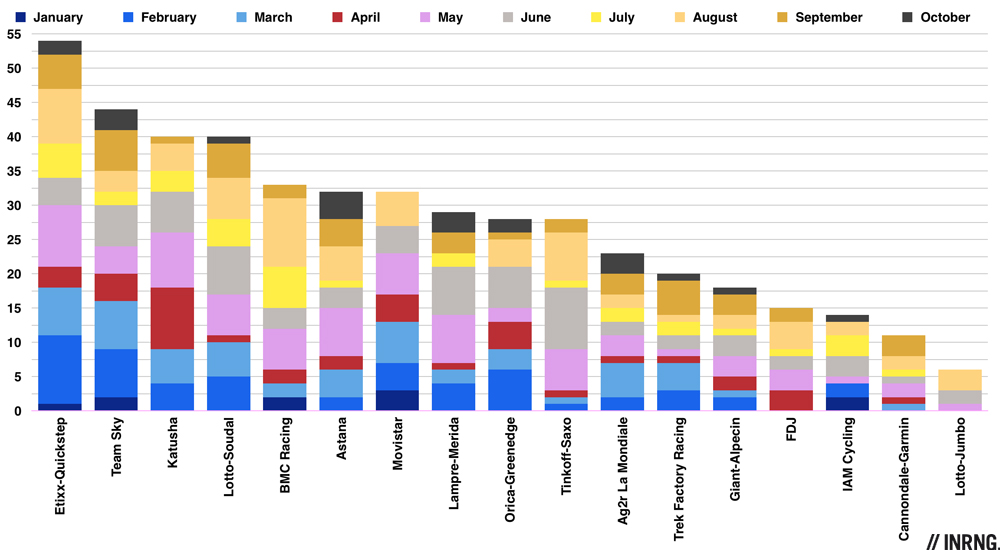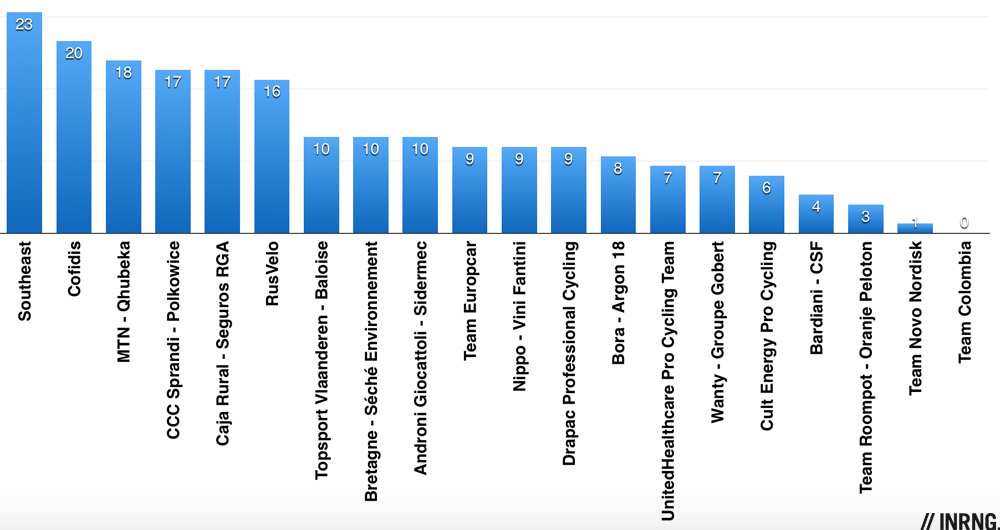A final look at the victory rankings for the teams. With the season finished it’s time to look back at the wins and also look deeper within them. Which months are the best time to win? Does starting off well ensure a team rides well all year? Which teams had the most podium places but the fewest wins? Which teams are the most reliant on one rider?
Etixx-Quickstep top the table and once they took the lead in the rankings in February they never looked back. They’re one of the sport’s super teams but apparently their budget is below that of BMC Racing, Team Sky, Katusha and Astana. Even the biggest teams have their niches, for example BMC Racing may be a mega budget team but they rarely contest a bunch sprint, leaving this domain to others; Team Sky fill this niche with Elia Viviani but they’re still very much stage race specialists and in 2015 Richie Porte took more wins than house sprinter Viviani this year. As for Etixx-Quickstep, they win a lot but are challenged by gravity, almost no wins to show in the mountains with Julian Alaphilippe the exception to the rule with his Mount Baldy win in the Tour of California.
Now to look more deeply into the results…
The chart above shows the share of each team’s wins by its lead rider, in other words how dependent a team is on one rider to bring in the wins. Obviously the trends vary, Lotto-Jumbo only won six races so Moreno Hofland’s two wins account for a third of this so treat teams towards the right of the chart more cautiously as we’re talking about few wins to share. But the stat for Katusha is interesting with Alexander Kristoff delivering half of the team’s wins and André Greipel bringing 40% of Lotto-Soudal’s wins. It’s what you’d expect in a team built around a strong sprinter but one injury here can really dent a team’s results and with it morale and more.
Meanwhile Mark Cavendish was Etixx-Quickstep’s top rider and his contribution helps them take first place in the table but what is remarkable is how 15 of the team’s 29 riders, including stagiaire Fernando Gaviria, took solo wins in the year. Tinkoff-Saxo’s most prolific rider was Peter Sagan while it was at Team Sky it was Richie Porte on nine ahead of Elia Viviani on eight. Sagan finished on the lower steps of the podium more often than he won this year but what of the other teams?
This chart shows the share of each team’s podium places in 2015 with gold, silver and bronze to depict first, second and third places. Normally you’d expect an even distribution but in 2015 some teams struck gold disproportionately. Again parsing lowly Lotto-Jumbo’s wins doesn’t tell us too much as it’s a small data set but all the same look at 18% of their podium places were wins, a surprisingly low figure. Meanwhile mid-table teams like Orica-Greenedge and Tinkoff-Saxo have a lot of silver meaning so many second places but there’s little bronze suggesting, if anything, that their second places are not necessarily missed wins but upgraded third places.
Now to the rankings month by month. The chart about shows the standard team victory rankings for 2015 but each tone represents a month of the season. Apologies for the eyesore and if it helps pink is May and yellow is July but this lets us see when teams thrived. It’s reasonably random. Look at the January, February and March in blue and you can see the wins racked up by Etixx-Quickstep and Sky help but there’s plenty of blue for Ag2r La Mondiale and Trek Factory Racing, even some for IAM Cycling too. All told if you run a correlation check the first three months of 2015 weren’t always conclusive for a team’s fortunes it’s only by the end of May that the patten really firms up.
Finally the Pro Continental rankings for 2015 with Southeast the surprise winner. They take pole position thanks to Jakub Mareczko, the Italo-Polish sprinter took seven stages of the 2.1 Tour of Taihu Lake as well as the overall classification to see the Italian team fly past the likes of Cofidis, MTN-Qhubeka. Of course it’s still quality vs. quantity but with Marecko it’ll be interesting to see what they do next year, he was red hot as an amateur last year and has thrived in the pro ranks and if progress continues he’ll start to challenge in bigger races.
Methodology: all World Tour, *.HC and *.1 and races are included in the rankings above. Wins are for first place or the overall classification.







It’s quite interesting to compare these rankings with CQ team rankings. At World Tour level it’s not that different: the same teams are around the top and bottom, although Movistar fare noticeably better. It’s also closer at the top, confirming the sense that EQS spread their wins in terms of quality too.
Pro-Conti is different: Southeast are 10th. They’ve earned a Giro invitation to be fair.
Southeast and the Giro, *if* they survive. However, they’ve got several good riders along with Mareczko, it would be a pity to lose them all, whereas the team’s management… brrr *shivers*
Interesting use of the word ‘earned’ there.
The graphs show that Etixx-QS have a well balanced squad that can rack up wins at both ends of the season, with a summer win list that can stand up against the stage racing specialist squads. And as you point out, all done with a 2nd tier budget. Well done Mr. Lefevre!
Agreed.
But, as ever with statistics, you can look at results in any manner of ways.
The top WT team only won 11.5% of total races for instance. Or just over 1 in 10. So you could say that the WT is a good example of a meritocracy in pro sport. That kind of win ratio would get a team nowhere in other team sports, apart from the coaching team getting the sack.
Or, alternatively, this sharing of wins around the teams is one-in-the-eye for those who complain of the lack of aggressive riding. The stats can tell you that the peleton is a *very* competitive place.
I liked Inrng’s ‘Efficiency Rating” recently ; Lotto Soudal were highlighted, and indeed still show up well on the number of total victories – a good season by any standards.
It would be interesting to know all the team’s budgets, and look at success that way.
Though other team sports are generally made up of matches between two teams, so an average team would expect to get a 50% win ratio by definition. Whereas most bike races have around 20 competing teams, and therefore the average team’s win ratio is closer to 5%.
Looking at it over the whole season, the average WT/PC team got 17.75 wins, and the standard deviation (bear with me) is about 12.8. In those terms, EQS’s 54 wins were around 2.8 standard deviations above average. This is, roughly, the same as a 110 win baseball season, or 14-2 NFL season.
Yes, good point.
Having said that, if you look at Inrng’s comparative team victory tables for 2013 and 2014, you will see that the wins are even-ing out more – Etixx have significantly fewer victories in 2015 than those past two years.
I wonder if 2015 is some kind of a watermark for Sky’s team approach ; their victories have been 35 in 2013 (a vintage Tour-winning year) and 26 in 2014 (Froome’s Tour crash, Porte’s illness etc).
This year they have challenged in different types of races from Spring one-dayers, sprints, to the usual stage race success.
I feel that their new signings build upon this holistic approach and that they could challenge Etixx for top team in 2016, though Etixx’ new sprint signings could well hold the key to staving off this challenge.
As a stats man I appreciate this answer. The other non stat way of looking at is; how often does the number one NFL/NBA team then go on win the Super Bowl? Probably a similar stat to the 10% win ratio stated above for WT teams.
T’is a pity the UCI ranking system isn’t up to the job of ranking.
I posted as Switch above, didn’t notice you did too!
Are these a better sign of how a team did than the World Tour Rankings?
Neither seem to have it spot on: the flaw with this system is that some victories mean more than others, which this doesn’t account for; the flaw with the WT rankings is that a team can win that by racking up a lot of non-victory points.
Which is why it’s not too surprising to see that Movistar have the lowest percentage of victories (29%) in their podium finishes of any of the top ten teams.
The rankings above are purely quantitative, but there are stories behind then. For qualitative analysis that attaches a weight to rankings, many use the Cycling Quotient ranking system:
http://www.cqranking.com/men/asp/gen/cqRankingTeam.asp?current=1
Thanks. Even that seems far from perfect – BMC are above Tinkoff-Saxo, for instance.
For me, this just shows why an overall rankings system, whilst interesting, is not the way for cycling to go – individual race wins tell you more and you can judge the quality of those wins for yourself.
I wonder if your methodology was influenced by “The Economics of Road Cycling” (reviewed here a couple of weeks ago). Your previous team rankings (full list at http://inrng.com/?s=team+rankings) looked only at victories; this time you added the balance of podium placings and a month-by-month analysis.
Interestingly the dynamics of winning outright versus being placed second or third and seasonal ‘peaking’, etc. have been discussed before regarding individuals (Sagan, Kristoff, Valverde…) but this is the first time you integrate it into the quantitative analysis of team performances.
The further analysis was partly inspired by readers with previous comments on the rankings during the season exploring whether a good start to the season meant a solid run all year and more.
Also, and I have no stats to hand to back me up here, the World Tour seems to disproportionately reward stage racers. Its generally won by stage racers, usually Valverde or Rodriguez, and you get the likes of Contador and Quintana who barely race (never mind win) all year comfortably ahead of monument winners such as Degenkolb and Kristoff. In my eyes its too awkward and clumsy to rank stage racers and one day specialists together and they should have a cup each to aim at.
Or at least reward actual wins – you get more points for clinging onto a fairly meaningless 13th overall in the Tour than you do for winning a stage.
I wonder if an Elo type ranking could be created for cycling – obviously it’s way more complicated with 200 riders in a race vs 2 players in a chess match. The idea though would be that a rider gets more points by beating more highly ranked riders, so there would be more points going for races with stronger fields.
I’ve just had a brief look at the history of the World Tour rankings and the top 3 has always been made up from stage racers apart from 2010-2012 when Gilbert and Boonen had golden spells and managed to infiltrate. Although I suppose you could argue Valverde and Rodriguez are also one day riders. Oh, and Gerrans was third last year. Gilbert’s the only what you could call out and out one day racer to win it though in 2011.
The Financial Times attempted to do an Elo-type ranking for Sprinters. It’s behind a paywall, but described here: https://www.lfgss.com/conversations/255686/?offset=5000
somewhat skewed this season by Kittel’s absence.
I partly agree about the problems of a mixed ranking, albeit it’s interesting to try and see what comes of it. I did the maths some time ago on these same pages, and even if one might indeed consider to shift the points system it really wasn’t *that* unbalanced.
Personally, I’d grant just a bit more point for one-day races (or maybe I’d add some more of them), I’d reward better stage victories in the GTs and I’d shave some points from lesser stage races, especially the less established ones. Perhaps a two levels system like the one they use with the Monuments would be useful for short stage races, too.
However, we shouldn’t forget that the ranking is a tool with a double and partially self-contradictory function: on the one hand, it tries to mirror the fans’ perception, to be perceived as something which *more or less* makes sense (and while I was reading the final classifications again with hindsight, and looking to the placements, too, I found myself quite surprised by the fact that it didn’t actually look as absurd as I had always considered it). OTOH, it serves the purpose of promotion for races that the UCI feels the need to foster, which ends up partially distorting the weight system within the ranking (the points attributed to the TDU or to the Canadian events, all races which I quite like in themselves, appear pretty nonsensical in terms of sporting value, ditto for Plouay, Pologne or ENECO, until very recent years at least).
The “problem” with the winners of the overall ranking that you point out depends, obviously enough, on the fact that when you’ve got a rider who’s good both in Classics and in GTs he’ll tend to prevail over specialists. Rodriguez and Valverde are Monument winners who get on the podium of a GT. Nor Degenkolb nor Kristoff are half as good as those two, until now, at least – in absolute terms.
Another “problem” we might have now is that some present GT riders are *really* good. Quintana who “barely raced” won the Ti-Ad in March, had a pretty notable Tour in July and nearly podiumed in the Vuelta in September. He made the top ten both in País Vasco and Romandie, respectively in April and May. He was racing in January and June, too (3rd in S. Luis, 2nd in the Route du Sud) even if those weren’t WT races. I’ve been hugely disappointed by Quintana’s season, but that’s because I was expecting so much… The numbers don’t expect anything, they just record what happens, hence they can’t but show that it’s fine enough when you produce top-level performances in *two* GT’s final GCs, plus high-level result in three shorter but first-class stage races, winning one of them, plus podiuming in minor races. I consider that a 4th place in País Vasco or the Vuelta is “a bad result” for Quintana, and that he should have won the Tour, but the numbers don’t know anything of this.
Degenkolb and Kristoff both had an impressive, break-through season. We knew they were good, but both of them surprised us this year and we felt they deserved sooo much. All the same, if we look to their results with colder eyes, Degenkolb made the great Sanremo-Roubaix double, then couldn’t really find himself nor consistent winning ways through the rest of the season. The point system doesn’t reward much stage placings, in the Tour you must win to get at least some juicy 20 points, and he simply didn’t win very much else. Kristoff was devastating on the pavé, then he went on winning… minor things. However, he’s fourth in the final ranking, above Aru and Froome, well above Contador, just a handful of points behind Quintana.
A ranking is about… doing well along several races. The isolated special performance, as the Sanremo-Roubaix double, shines by itself and will be remembered as such – much more than the WT podium or the WT winner himself – but it wouldn’t make sense to reflect that in a general ranking, unless the rider is able to confirm his standard elsewhere, too.
Fair point. By anybody’s assessment Valverde has been impressively consistent for a couple of years now, as has Purito, and that is reflected in the rankings. I would still like to see a ranking of one day races though.
Consistency, in other words Gabriele.
And all the ranking permutations still show Valverde and Etixx as the most consistently successful rider / teams respectively I believe.
Yep, the World Rankings are basically the season-long Green Jersey.
Is the ‘Top Team’ a mantle that is highly prized in the WT ?
We’ve seen Movistar, for example, put great store on top team in the GT’s.
And Sky’s signings for next year seem to indicate a stronger all-round approach to the season, rather than concentrating on the GT’s ; I wouldn’t mind betting that the top two teams switch orders by this time 2016…
Movistar certainly love it. But then they dont have the Tour win to puff off – and they would swap that UCI WT Team ranking in a heartbeat for the maillot jaune.
Its all about the Tour for both teams.
They sure would swap the two prizes, but it’s not all about the Tour for Movistar. If it was, they would have probably won it ^__^
Jokes apart, I’d say Movistar produced great efforts in a greater range of races when compared with Sky, both before and after the Tour (to cast away any doubt about some great racing being just a prep for the big shot more than a task in itself, or a consolation prize).
I think that nowadays Sky isn’t at all as Tour-centric as many want to believe, or, at least, it isn’t anymore as much Tour-centric as it used to be.
Still, you can feel (perhaps I’m imagining it?) a rather distinct intensity in their collective effort and emotive investment, a difference which is possibly greater than what’s obviously implied by Le Tour being Le Tour.
Quite the contrary is true when Movistar is concerned: even if they clearly aren’t interested in some objectives (like Sky, each one with its own different selection), they look like they’re able to fully throw themselves in some other projects, as a group, not in terms of individual exploits’ like Thomas’ or Viviani’s.
Maybe what really strikes me is the difference between the strong team attitude often shown by Sky in the TdF and other situations.
However, I’d like to insist on the fact that Sky is indeed trying to operate a sort of shift or change, and they’ve also been speaking about that for a couple of years or so.
Yes, I think Sky have been trying to change a little.
However the acid test when it comes down to it is that preparation (and I dont mean in THAT sense 🙂 for the Tour trumps everything else in Sky, whether its Froome’s race program, or that of the riders who are nailed on as his henchmen way ahead of the Tour.
Not a criticism – it is what it is – but when it comes to it, anyone and anything will play second fiddle to that. Darroch, J and Murdoch, J, are absolutely infatuated with the Tour.
Oh yeah, Sky loves the Tour, especially because they can win it. Valverde and Movistar would have put more effort into winning the Tour if they felt Valverde could have really challenged for the win (remember in 2004 that Valverde was seen as a future Tour champ). Now that Quintana’s really coming into form, they’re going to give a strong effort to win this year!
Valverde will always do a more varied approach because he’s a top one-day challenger. He wants the Olympics (and knows he’s an outside shot to win the tour this year)
Well, as someone who really and truly cant stand Froome but who likes Quintana very much, I’ll be hoping Quintana can do it. And that Movistar look after him somewhat better than usual in the early stages.
DMC: hopefully, Movistar will fully back Quintana in the 2016 Tour – as they should have in the 2015 Tour. (Was Quintana strong enough to win, with better tactics? Was Froome actually sick or just weakening? We don’t know.)
Seems that Valverde is doing the Giro – so maybe he’s finally accepted (or been made to accept) that he can’t win the Tour. (And no doubt Valverde is also hoping that this way he can better focus on the Olympics – and maybe perform at the Vuelta.)
I’m definitely hoping that quintana and movistar give froome a solid run for their money. It’ll make an awesome Tour from a fan’s perspective if there’s a great 2 or 3-way race with each guy right there the entire time.
The one thing that Movistar needs to do though is make sure that Quintana is protected during the early stages – they’re notoriously bad at this. Even without a pave stage, the first stages are dangerous for small climbers. They have to fight for their position in the sweet spot of the pack or else Quintana can lose many minutes before the first hill.
OH, one more thing, Quintana better learn quickly how to limit losses in time trials…
Contador and Froome know how to handle TT’s and the early stages like true pro’s and this is what separates them in my mind.
This is really interesting – thank you.
Looking at the 1st/2nd/3rd graph, Lampre have had a great season. From all of their placings, 46% were wins.
If Cavendish takes the same win-rate to Dimension Data next season – and their other riders take the odd race or stage here and there – then the team will take 20-25 wins. Very respectable.
What the numbers don’t say is that Etixx has had a *largely* unsatisfying season. I’d say a 5/10 mark. That’s what some people struggle to understand about cycling – and I really hope it says like this 😛
Agreed – Quickstep won a lot of races, but didn’t win the 2 races that really only matter to them – Flanders and Paris-Roubaix (or Worlds which is a consolation prize). So in their minds they’re only 0/2 (3), which is a poor season.
Of course they rode really strong for much of the spring, but had some bad luck and didn’t execute like they should have (Oomloop… c’mon that was not very smart racing).
They are expected to perform strongly in the cobbled classics – and when I say peform strongly, I mean win. And when they dont, the Belgian press start kicking up as soon as Omloop is done and dusted.
To some extent yes, I made the point above about their overall win numbers being less than the last two years.
Spring travails, sprinter / lead-out issues, injuries.
But that they’ve remained top team again says much for their all-round strength and aggressive racing culture ; they are a very proactive team and look to make things happen.
And a fully-fit Martin and Kittel combination looks daunting.
Oh yeah – if Kittel gets back to form (I’d expect nothing less), this year’s Tour sprint battles should be great to watch. Martin will be a great help for Kittel’s chances.
The only issue is who will be Kittel’s later sprint leadout helpers?
Really interested that Movistar didn’t win anything after august (with a very strong showing in the earlier part of the year). As the only Spanish team I would have expected there to be substantial focus on the Vuelta and therefore wins around that time as they come into form, but it goes to show how strongly the focussed on the Ardennes Classics and the Tour.